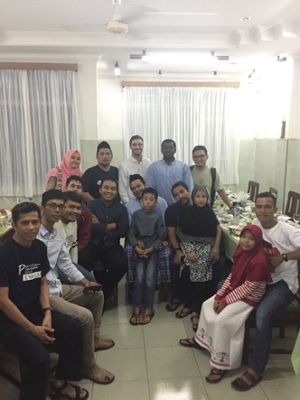Team PUSaKO
Last week was the final week at the PUSaKO office before the break for Lebaran, which is what Indonesians call Eid al-Fitr. This is the celebration week for the end of Ramadan. To begin the celebration a little bit early, the entire PUSaKO team went to dinner at a local restaurant. It was great to have everyone in one place, and I even got to meet some more members that had been outside of Padang over the last month.

I will spend Lebaran in Bukittinggi with a fellow PUSaKO researcher. Bukittinggi is West Sumatra’s third largest city and also served as a temporary capital for Indonesia in the late 1940s. While I have gotten to know Padang very well, it will be nice to have a temporary change of scenery. When I return from Bukittinggi, it will actually be election week in Padang and then I leave for the current capital city, Jakarta. Additionally, most Indonesians travel to their hometowns for Lebaran, so Padang has really started to slow down. While this helps with the traffic, it also means cafes and other places of business have begun to close their doors for the week. Especially by the University, certain sections of Padang are reminiscent of a ghost town at the moment.
Indonesian elections are beginning to make as much sense as they can. The elections on June 27th are for the local heads of government. When I asked PUSsKO director Feri Amsari if it is typical to hold the elections a week after the end of Ramadan, the most holy month, he replied that it is. One of the possible explanations for this is because it is traditional to give money as a gift to the less fortunate during Lebaran. This is a great way around the anti-bribery laws for politicians looking to buy votes in the upcoming election.
While corruption has been fairly open in prior elections, several electoral bodies are in place to limit political misbehavior. A parallel supervisory body monitors all the election commissions tasked with implementing the elections. For example, in the election of a mayor for a city like Padang, it is broken down into levels. There is the city level, the district level, the village level, and finally each individual voting location. At the city level the “City KPU” facilitates the election and the “City Panwaslu” directly oversee their actions. There are two entities exactly like this at every subsequent level. It is intended to ensure the elections are free and fair. However, this election will not be the first time these methods are used, and corruption has existed within the system before.
In Indonesia, there are many political parties. Most elections involve at least ten different candidates from different parties or coalitions of political parties. Each candidate gets a number, which becomes part of his or her tag line for the election. The numbers can be seen on billboards and campaign posters and flags. Indonesia actually has a law against all civil servants being in pictures with anyone displaying numbers during the campaign time. While this is intended to prevent bias or political involvement of state employees, it seems overly repressive. It is very common for young men and women to include a peace sign in pictures here, but the law prevents that for civil servants or anyone in a picture with them during this time.